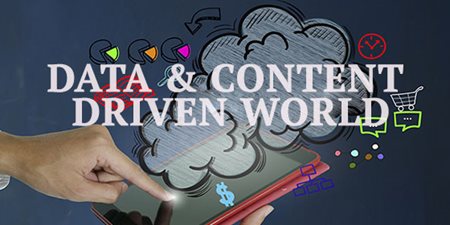Top Features Your Content Management System Must Have
By Lynette Sawyer
January 28, 2019
AI, Analytics, content management, Content Management System, Data Analysis, Enterprise Content Management, personalization, technology, voice search, Web Content Management, Workflow
It's no surprise. We live in a digital and content driven world. Whether you are trying to reach your employees or customers, improve your Google search rank, or launch a product or service, fresh delivery of content is key. Many businesses are struggling to manage increasingly large bodies of content, and over multiple channels. With the rising tide of data, this has meant content management systems are playing a key role—if not the backbone—in supporting business and marketing efforts. As every business is different, likewise is every CMS system. Even so, there are essential CMS elements that are a must have for every business.

In our last post, we highlighted the top five features that your content management system must have. Since then, CMS systems have rapidly progressed and increasingly integrated with more recent technologies like analytics, artificial intelligence (AI), machine learning (ML), and even blockchain. As many of these systems have advanced, our updated 2019 edition highlights the top features your CMS system must have.
Advanced Security Management
Security is at the forefront of any business's digital and/or technical interactions. Not a week or month goes by that there is no organization or business that hasn’t been impacted by a major data or security breach. Therefore, strong security management is a prerequisite for your CMS. With the rising numbers of blogs, sites, or people accessing content, lax safeguards can pose a major threat. Security within your CMS not only protects your website, but it also protects your customer data as well. Whether you are considering changing your CMS or upgrading, consider the following for your security management:
-
What does the CMS platform offer in terms of security?
-
How much work is involved for your team to achieve your security standards?
-
Do you require your customers and their data to be secure?
-
Will your customers need the sense of security when accessing your site?
User Friendly Interface & Easy Administration
Like any other admin dashboard, it is the heart and soul of a platform and the most interactive. Accordingly, your CMS dashboard should have a very user-friendly interface and be straightforward to manage. When it comes to content administration, your dashboard should be able to easily handle:
-
Tracking of scheduled content and related assets
-
Monitoring CMS site and administrative activity
-
The ability to add functionality through modules and/or plugins
-
Management of notifications
-
Administering multiple sites and platforms
Powerful Publishing Tools
Just as your content is the backbone to interacting with your audiences, a powerful publishing tool is also a core feature of any CMS. A good content management system should, and can, adapt to any type of content your team is looking to publish, and be able to seamlessly integrate into your business's overall publication workflow. Over and above content publishing, you should look for a platform that will also handle SEO, images, video, and more. As we noted above, it should also be accessible and user intuitive, and better yet, be able to drag, and drop, and move your content around with ease.
Support for Voice Search
The rise and adoption of AI features like chatbots and voice are becoming increasingly important across all digital platforms, including your CMS system. Enter Microdata, a specific type of data published on a website that will allow search engines, like Google, to read and interpret. If understood, it can be included in search results from questions by both text and —more increasingly—by voice search. As answer-driven over information-driven searches increase with the use of assistants like Siri and Google Assistant, metadata results will rise in priority, as will the requirement of your CMS to optimize microdata for your content to ensure these are served up in relevance to your business's products and services.
Versioning
Let’s face it, we aren’t perfect with how quickly we move or need to adapt. The same is true for our content. It’s inevitable that there can be some errors in your content, flaws with your editing and reviewing process, or publishing wrong drafts. Proper versioning will ensure your content will be available to your team so that you can re-edit, pull old messages or drafts, and republish if needed. In addition to tracking your content drafts, there is also a valuable feature for pages or section management of campaigns, such as events or promotions. Moreover, if you want to revert to the older version when done, you should be able to do that too. Some of the first features we profiled, that are still equally as important today, are also included in my list below.
Enhanced Workflows and Permissions
One of the most common problems businesses experience with digital platforms—including content management systems—are not having the right permission levels and the ability to tailor them to their needs. In order to have a CMS that is optimized for your business, you need permissions and roles that work for you and will adapt to your needs including reading, writing, editing, publishing, and admin capabilities
Open APIs
Application programming interface—or better known as API—is one of the most commonly used terms when it comes to any digital platform, including a CMS. Any developer or experienced marketer will ask about APIs. What makes the API such an important feature? This feature promotes data exchange between two systems, allowing them to interact and share data easily. A CMS with an open API will allow your business to scale, feature-rich, and enhance your site, as well as build apps that are detached from the content management tools. An API gives you the benefit to use your choice of front-end tools and integrate with other external and internal systems effortlessly.
Detailed Analytics and Personalization
Why send out content if you aren’t tracking its engagement? Tracking engagement of your content across all of your platforms is an essential part of carrying out your content strategy. Your CMS platform should make measuring the performance of your published content simple and efficient. Analytics of your content has numerous benefits which can include understanding your most persuasive content, and/or where you can improve and optimize. Additionally, depending on the data you collect, you can further refine your content strategy and personalize the content experience for your customer. For a CMS to perform this function well, it should smoothly integrate with some of the most effective analytical tools available, such as Google Analytics, as well as gather and glean the business insights you need.
Ending Notes
Just as quickly as technology evolves, so will CMS systems. As we see the development of new features that are based on customer demands, governance policy, or establishment of new wave of access, we will also see the continuing development of the fundamental features you should expect from a good CMS platform. From new microdata requirements, to versioning, to a good user interface, your next—or current—CMS should take advantage of these cutting-edge innovations.

Lynette Sawyer
Lynette Sawyer is a Web Project Manager for Falcon-Software, a digital web agency founded in 1994. For the last 13-years Lynette has been in various digital capacities and her expertise goes beyond Project Management. Lynette brings experience and knowledge in graphic design, marketing communications, project management, product management and engagement.